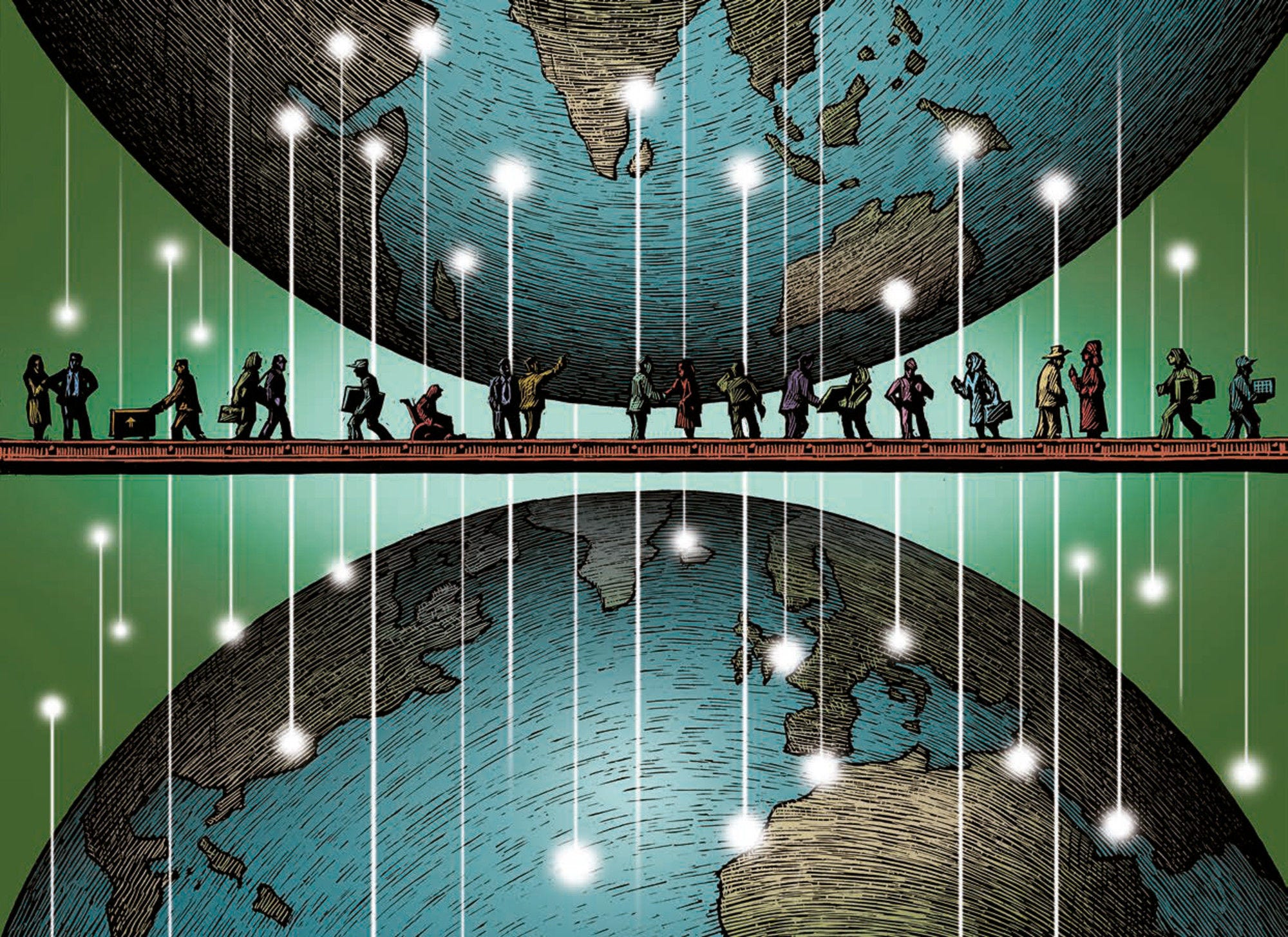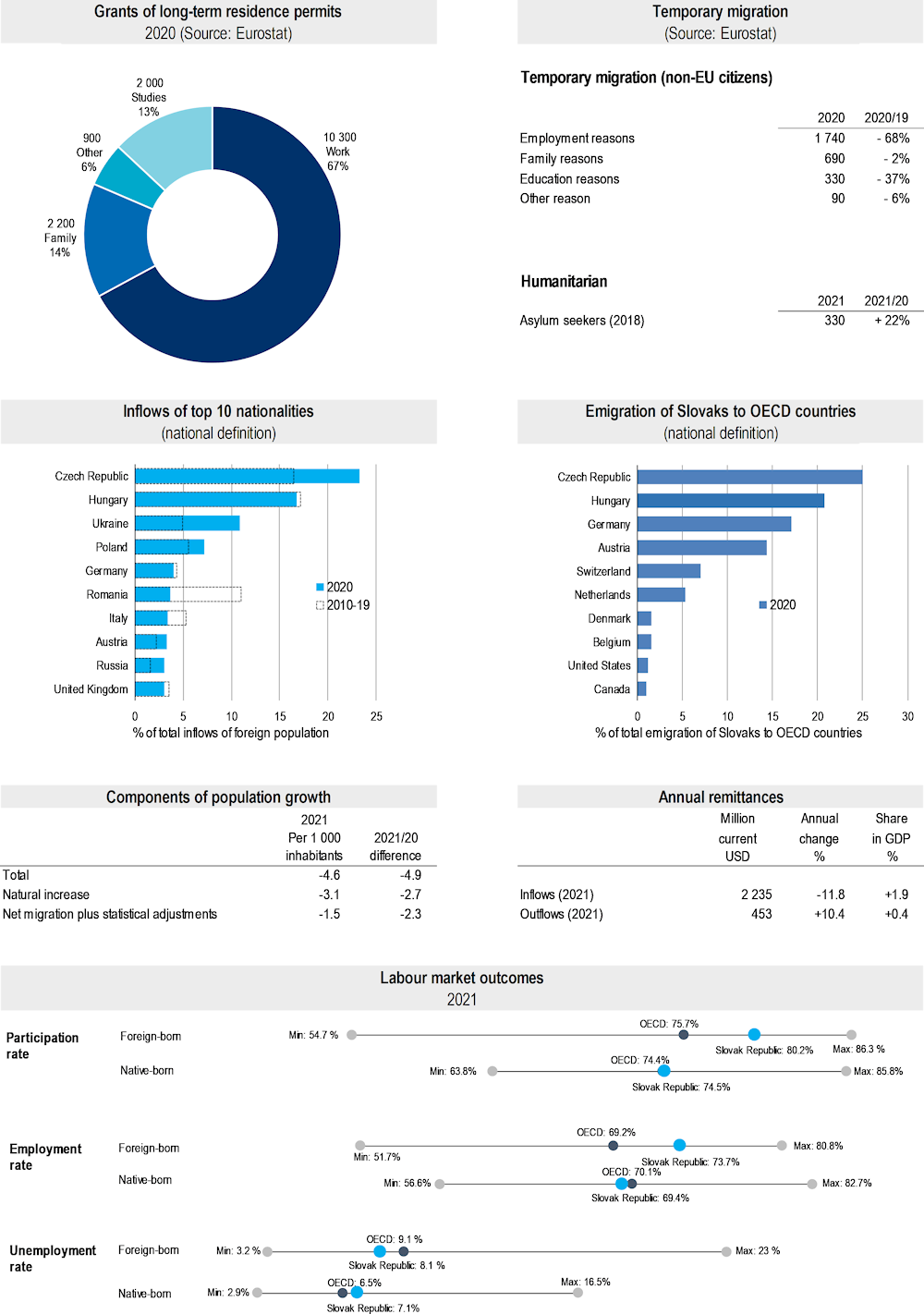In 2020, 15 000 new immigrants obtained a residence permit for longer than 12 months in the Slovak Republic (excluding EU citizens), ‑30.3% compared to 2019. This figure comprises 67.1% labour migrants, 14.4% family members (including accompanying family), 13% who came for education reasons and 5.5% other migrants. Around 300 short-term permits were issued to international students and 1 700 to temporary and seasonal labour migrants (excluding intra-EU migration). In addition, 18 000 intra-EU postings were recorded in 2020, a decrease of ‑45% compared to 2019. These posted workers are generally on short-term contracts.
The Czech Republic, Hungary and Ukraine were the top three nationalities of newcomers in 2020. Among the top 15 countries of origin, the Czech Republic registered the strongest increase (300) and Romania the largest decrease (‑78) in flows to the Slovak Republic compared to the previous year.
In 2021, the number of first asylum applicants increased by 24.5% to reach around 300. The majority of applicants came from Morocco (100), Afghanistan (90) and Algeria (20). The largest increase since 2020 concerned nationals of Morocco (65) and the largest decrease nationals of Syria (‑25). Of the 130 decisions taken in 2021, 35% were positive.
In September 2021 a new migration policy for the period until 2025 was adopted, replacing a policy adopted in 2011. The document focuses on economic migration and humanitarian migration. Family reunification and migration of students are not explicitly dealt with. The return of emigrants is among the priorities of the new policy, including continuation of return support programmes; however, recently adopted return schemes for highly qualified experts attracted very few returnees.
As a response to the COVID‑19 pandemic, amendments to the Act on the Residence of Aliens extended the validity of temporary residence, permanent residence or tolerated residence until two months after the revocation of the crisis. A third-country national who had legally entered the territory of the Slovak Republic but was not yet granted a residence permit could stay until one month after the revocation of the crisis. A third-country national outside the Slovak Republic could submit an application for the renewal of temporary residence or an application for permanent residence for an indefinite period at the embassy.
In effect from 21 May 2020, an amendment of the Employment Services Act in connection with the Residence of Aliens Act extended the validity of the relevant confirmations of the possibility of filling a vacancy or employment permits for the third-country nationals. It would expire at the time of the declared COVID‑19 emergency, within two months of its withdrawal.
Free circulation of workers in border regions has been regulated by various ad hoc acts of the Public Health Agency during the pandemic. In general, the goal was to ease the movements of “pedlars” from neighbouring EU countries (Czech Republic, Austria. Hungary, Poland) by stipulating various exemptions (from quarantine, COVID‑19 testing, etc.). The measures were focused on the population living within 30 km from borders, or on persons with an employment contract in one country and residence in another. Many issues remained problematic, notably for the Slovak citizens living in neighbouring areas in Austria and Hungary who experienced difficulties commuting to work or schools during border closures. The problems were particularly intensive in the neighbourhood of the capital Bratislava, close to the Austrian and Hungarian borders.
In order to attract talents and professionals, a governmental decree, with effect from 1 April 2022, facilitates access to the labour market for selected occupations for highly qualified third-country nationals who are graduates of top universities. Visas are issued for the purpose of seeking employment for up to 90 days; or for the purpose of employment for a maximum period of one year.
Another governmental decree, with effect from 1 April 2022, regulates the issuance of visas in occupations with labour force shortage such as bus and heavy truck drivers for third-country nationals from Belarus, Serbia, North Macedonia, Bosnia and Herzegovina, Montenegro, Georgia, Armenia, Moldova and Ukraine, for maximum period of one year.
For further information: www.minv.sk

